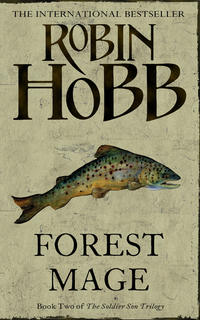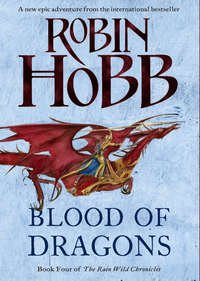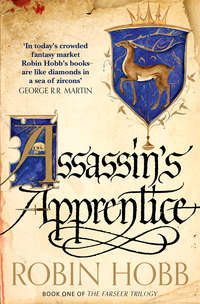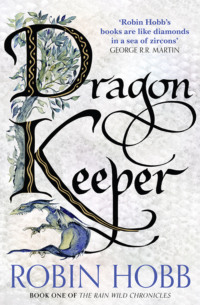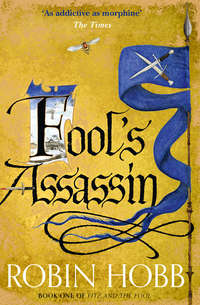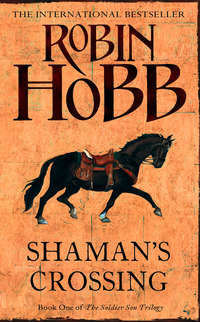
Полная версия
Ship of Magic
7 LOYALTIES
IT TOOK THE REST OF THE DAY to bury his grandfather. Runners were sent throughout the town to advise friends and neighbours, and his death services were cried aloud in the public markets and on the dock. Wintrow had been surprised at the number of people who came, and how swiftly they gathered. Merchants and sea-captains, Old Traders and tradesmen forsook the business of the day and converged on the dock and ship. Those closest to the family were welcomed aboard Vivacia, and others followed on the vessels of friends. Every liveship currently in the harbour followed Vivacia as she carried her former master out to where he would be surrendered to the sea.
Wintrow was uncomfortable throughout the whole ceremony. He could not sort out what he felt about any of it. It stirred his pride that so many turned out to honour his grandfather, but it seemed uncouth that so many of them offered first their condolences and then their congratulations on the quickening of the ship. As many who stopped beside the body to pay their final respects also stepped forward to the bow of the ship, to greet Vivacia and wish her well. That was where his grandmother stood, not by the body of her dead husband. Only his grandmother seemed to notice his unease. At one point she quietly told him that he had been too long away from Bingtown and its customs. That they congratulated her on the ship did not diminish one whit the grief they felt that Ephron had died. It was simply not the way of Bingtown folk to dwell on the tragic. Why, if the founders of Bingtown had dwelt on their tragedies, they would have drowned in their own tears. He nodded to her explanations, but kept his own private counsels as to what he thought of that.
He hated standing on the deck next to his grandfather’s body, hated the proximity of the other great-sailed ships as they left the harbour together to do homage to his grandfather’s burial at sea. It all seemed overly complicated, not to mention dangerous, to have all these ships sail forth, and then drop anchor in a great circle so folk might crowd along their railings and watch Ephron Vestrit’s canvas-wrapped corpse slide off a plank and slip beneath the moving waves.
Afterwards there was some totally incomprehensible ceremony in which Vivacia was presented formally to the other individual liveships. His grandmother had presided quite solemnly. She stood on the foredeck and loudly introduced Vivacia to each ship as it was sailed across her bow. Wintrow stood alongside his scowling father, and wondered both at the smile on the old woman’s face and the tears that coursed down it. Clearly, something had been lost when he was born a Haven. Even his mother had looked on glowingly, her younger two children standing at her side and waving to each ship in turn.
But that had been the larger scope of the ceremonies. Aboard Vivacia, there had been another sort of ritual entirely. Kyle possessed himself of the ship. Even to Wintrow’s untrained eyes that was plain. He barked out orders to men decades his senior and cursed them roundly if he thought they did not scamper quickly enough to his will. More than once, he loudly observed to his first mate that he had some changes in mind to make in the way this ship was run. The first time he said those words, something like a grimace of pain crossed Ronica Vestrit’s features. Observing her quietly the rest of the afternoon, it had seemed to Wintrow that the old woman grew graver and graver as the day passed, as if her sorrow for her husband’s death took root in her and grew with each passing hour.
He found little to say to anyone and they said even less to him. His mother was occupied with keeping a sharp watch on little Selden, and preventing Malta from even exchanging glances with any of the younger deckhands. His grandmother mainly stood on the foredeck and stared out over the bow. If she spoke at all, it was to the figurehead, and quietly. The very thought of that put a shiver up Wintrow’s spine. There was nothing natural about the life that animated that carved artefact, nothing at all of Sa’s true spirit in her. While he sensed no evil about her, neither did he sense anything of good. He was glad he had not been the one to insert the peg in her, and avoided the foredeck.
It was only on the trip home that his father seemed to recall he had an elder son. In a sense, it was his own fault. He heard the mate bark an incomprehensible order at two of the men. In trying to step quickly out of their way, he blundered backwards into the path of a third man he had not even seen. They both went down, Wintrow hard enough to knock the wind out of his lungs. In a moment the hand had sprung back to his feet and dashed on to his duties. Wintrow stood up more slowly, rubbing an elbow and gradually remembering how to breathe. When he finally managed to straighten up, he found himself face to face with his father.
‘Look at you,’ his father growled, and in some puzzlement Wintrow glanced down at himself, wondering if he had dirt on his clothes. His father gave him a light shove on the shoulder.
‘I don’t mean your priest’s robes, I mean you. Look at you! A man’s years and a boy’s body, and the wits of a landsman. You can’t even get out of your own way, let alone another man’s. Here. Torg. Here! Take him and put him to doing something so he’s out of the way at least.’
Torg was the second mate. He was a brawny man if not tall, with short blond hair and pale grey eyes. His eyebrows were white; it struck Wintrow that his face looked bald, it was composed of so many pale things. Torg’s notion of keeping him out of the way was to put him below, coiling lines and hanging chains in the chain locker. The coils that were already there looked just fine to Wintrow, but Torg gruffly told him to coil them up tidy, and not be slack about it. It sounded easier than it was to do, for once disturbed, the coils tangled themselves alarmingly, and seemed reluctant to lay flat again. The thick, coarse ropes soon reddened his hands and the coils were much heavier than he had expected them to be. The close air of the chain locker and the lack of any light save a lantern’s combined to make him feel queasy. Nevertheless, he kept at it for what seemed like hours. Finally it was Malta who was sent to find him, telling him with some asperity that they were dockside and tied up, if he’d care to come ashore now. It took every fragment of self-control he had to remind himself that he should behave as a future priest of Sa, not an annoyed elder brother.
Silently he set down the coil of rope he’d been working on. Every piece of rope he’d touched look less, not more orderly than when he’d began. Well, Torg could recoil them as he wished, or push the task off on some poor sailor. Wintrow had known it was busy work from the start, though why his father had wished to humiliate and irritate him, he could not fathom. Perhaps it had something to do with his refusal to push in the peg that quickened the ship. His father had said some wild words then. Well, it was over now. His grandfather was dead and consigned to the sea, the family had made plain they wished no comfort from him, and he would go home as soon as he decently could. Tomorrow morning, he decided, would not be too soon.
He went up on deck and joined his family as they thanked and bid farewell to those mourners who had accompanied them on board the ship. Not a few said their goodbyes to the living figurehead as well. The summer dusk was venturing into true night as the last person left. The family stood a bit longer, silent and exhausted, while Kyle gave orders to the mate for the unloading to proceed at earliest daybreak. Then Kyle came to tell the family it was time to go home. Kyle took his mother’s arm, and Wintrow his grandmother’s. He was silently grateful that there would be a coach awaiting them; he was not sure the old woman could have managed the uphill walk through the dark cobbled streets.
But as they turned to leave the foredeck, the figurehead spoke up suddenly. ‘Are you going?’ she asked anxiously. ‘Right now?’
‘I’ll be back at first light,’ Kyle told her. He spoke as if a deckhand had questioned his judgement.
‘Are all of you going?’ the ship asked again. Wintrow was not sure what he responded to. Perhaps it was the note of panic in her voice.
‘You’ll be all right,’ he told her gently. ‘You’re safe, tied up to the docks here. There’s nothing to fear.’
‘I don’t want to be alone.’ The complaint was a child’s, but the voice was that of an uncertain young woman. ‘Where’s Althea? Why isn’t she here? She wouldn’t leave me all alone.’
‘The mate will sleep aboard, as will half the crew. You won’t be alone,’ Kyle replied testily. Wintrow could remember that tone from his own childhood. His heart went out to the ship despite his better judgement.
‘It’s not the same!’ she cried out, even as he heard himself offer, ‘I could stay aboard if she wished it. For this night, at least.’
His father scowled as if he had countermanded his order, but his grandmother squeezed his arm gently and gave him a smile. ‘Blood will tell,’ she said softly.
‘The boy can’t stay,’ Kyle announced. ‘I need to speak to him tonight.’
‘Tonight?’ Keffria asked incredulously. ‘Oh, Kyle, not tonight. Not anything more tonight. We are all too weary and full of sorrow.’
‘I had thought we might all sit down together tonight, and discuss the future,’ his father pointed out ponderously. ‘Weary and sorrowful we may be, but tomorrow will not wait.’
‘Whether tomorrow will wait or not, I shall,’ his grandmother cut across the argument. There was a shadow of imperiousness in her voice, and for a moment, he recalled more vividly the woman he had known as a child. Even as his father drew breath to speak, she added, ‘And if Wintrow would sleep aboard and give comfort to Vivacia as best he can, I would take it as a personal favour.’ She turned to the figurehead and added, ‘I shall need him to escort me to the coach first, though. Will you be all right alone, for just a few moments, Vivacia?’
He had been vaguely aware of how anxiously the ship had been following their conversation. Now a beaming smile broke out over the carved features. ‘I am certain I shall be just fine, Ronica. Just fine.’ She shifted her glance to Wintrow, her gaze diving into his eyes so deeply that it startled him. ‘When you come back on board, would you sleep up here, on the foredeck, where I can see you?’
He glanced uncertainly at his father. They seemed to be the only two aware that he had not yet given his permission for this. Wintrow decided to be diplomatic. ‘If my father permits it,’ he concurred cautiously. He still had to look up to his father to meet his eyes, but he forced himself to do it and not to look away.
His father scowled still but Wintrow thought he also saw grudging respect in the man’s eyes. ‘I permit it,’ he said at last, making it clear to everyone that he regarded this decision as his. He looked his son up and down. ‘When you come on board, report to Torg. He’ll see you get a blanket.’ Kyle glanced from the boy to the waiting second mate, who nodded to the order.
His mother sighed out, as if she had been holding her breath. ‘Well, if that’s settled, then let’s go home.’ Her voice broke unexpectedly on that last word, and fresh tears spilled down her cheeks. ‘Oh, my father,’ she said softly, as if rebuking the dead man. Kyle patted her hand where it rested on his arm and escorted her from the ship. Wintrow followed more slowly with his grandmother. His younger siblings scrambled impatiently past them and hurried ahead to the carriage.
His grandmother moved so slowly, he thought she was excessively weary until she began speaking. Then he realized she had deliberately delayed to have a moment of privacy with him. Her voice was lowered, pitched for his ears alone.
‘It all seemed strange and foreign to you earlier today, Wintrow. Yet just now, you spoke as a Vestrit, and I believe I saw your grandfather in your face. The ship reaches for you.’
‘Grandmother, I fear I have no idea what you are talking about,’ he confessed quietly.
‘Don’t you?’ She halted their slow stroll and he turned to face her. Small but straight, she looked up into his face. ‘You say you don’t, but I see otherwise,’ she said after a moment. ‘If you did not already know it yourself, in your heart, you could not have spoken up for the ship the way you did. You’ll come to it, Wintrow. You’ll come round to it in time, no fear.’
He felt a tightening of foreboding. He wished he were going home with them tonight, and that he could sit down with his father and mother and speak plainly. Obviously they had discussed him. He did not know what they had been talking about, but he felt threatened by it. Then he sternly reminded himself to avoid pre-judgement. His grandmother said no more and he assisted her down the gangplank and then handed her up into the waiting carriage. All the others were already within.
‘Thank you, Wintrow,’ she told him gravely, and ‘You’re welcome,’ he replied, but uncomfortably, for he suspected she thanked him for more than walking her to the carriage. He wondered briefly whether he would truly welcome giving her whatever it was she assumed. He stood alone as the driver chupped to his horses and drove them off, their hooves thudding hollowly on the wooden planks of the docks. After they had gone, he lingered for a time, seeking the quiet of the night.
In truth, it was not quiet at all. Neither Bingtown proper nor the docks ever truly slept. Across the curve of the harbour, he could see the lights and hear the distant sounds of the night market. A trick of the wind brought him a brief gust of music: pipes and wrist-bells. A wedding, perhaps, with dancing. Closer to hand, the tarry torches bracketed to the dock supports provided widely-spaced circles of fitful light. The waves sloshed rhythmically against the pilings beneath the docks, and the tethered boats rubbed and creaked in their slips. They were like great wooden animals, he thought, and then a shiver walked up his spine as he recalled the liveship’s awareness. Neither animal nor wooden ship, he realized, but some unholy mix and wondered how he could have volunteered to spend the night aboard her.
As he walked down the docks to where Vivacia was tied, the dancing torchlight and moving water combined to confuse his vision and make every step uncertain. By the time he reached the ship, the weariness of the day had caught up with him.
‘Oh, there you are!’
He startled at the ship’s greeting, then recovered. ‘I told you I would come back,’ he reminded her. It seemed strange to stand on the docks and look up at her. The torchlight moved strangely over her, for though her features were human, the light reflected from her skin as it did from wood. From this vantage, it was markedly more obvious that she was substantially larger than life. Her ample bared breasts were more obvious from this point of view as well. Wintrow found himself avoiding looking at them, and thus uncomfortable about meeting her eyes as well. A wooden ship, he tried to remind himself. She’s a wooden ship. But in the gloom as she smiled down on him, she seemed more like a young woman leaning alluringly from a window. It was ridiculous.
‘Aren’t you coming aboard?’ she asked him, smiling.
‘Of course,’ he replied. ‘I’ll be with you in a moment.’
As he mounted the gangplank, and then groped his way forward on the darkened deck, he again wondered at himself. Liveships, so far as he knew, were unique to Bingtown. His instruction as a priest of Sa had never touched upon them. Yet there were certain magics he had been warned of as running counter to the holiness of all life. He ran through them in his head; the magics that deprived something of life in order to bring life to something else, the magics that deprived something of life in order to enhance one’s own power, the magics that brought misery to another’s life in order to enhance one’s own or another’s life… None of them seemed to apply exactly to whatever it was that wakened life in a liveship. His grandfather would have died whether the ship existed or not. He decided that one could not say his grandfather had been deprived of life in order to quicken the ship. At about the time he resolved that, he stumbled over a coil of rope. In trying to catch himself, his feet tangled in the hem of his brown novice’s robe and he fell, sprawling full length on the deck.
Somewhere, someone brayed out a laugh. Perhaps it was not at him. Perhaps somewhere on the shadowed deck, sailors kept watch together and told amusing stories to pass the time. Perhaps. His face still flushed, and he suppressed anger at the possible ridicule. Foolishness, he told himself. Foolish to be angered if a man was dull-witted enough to find his stumbling humorous, and even more foolish to be angry when he could not be certain that was the case at all. It had simply been too long a day. He got carefully to his feet and groped his way to the foredeck.
A single coarse blanket had been left in a heap there. It smelt of whoever had used it last, and was either badly woven or stiffened in spots with filth. He let it drop back to the deck. For a moment he considered making do with it; the summer night was not that cold, he might not need a blanket at all. Let the insult go by; he’d not be dealing with any of them after tomorrow. Then he stooped to snatch the blanket up from the deck. This was not the misfortune of an early fall of hail or a flooding river, a happenstance of nature to be weathered stoically. This was the cruelty of men, and a priest of Sa was not expected silently to accept it, regardless of whether that cruelty was inflicted on himself or on others.
He squared his shoulders. He knew how they saw him. The captain’s son, a boy, a runt, sent off to live in a monastery, to be raised to believe in goodness and kindness. He knew there were many who saw that as a weakness, who saw the priests and priestesses of Sa as sexless ninnies who spent their lives wandering about prating that the world could be a beautiful, peaceful place. Wintrow had seen the other side of a priest’s life. He had tended priests brought back to the monastery, priests maimed by the cruelty they had fought against, or dying of the plagues they had contracted when they nursed other victims. A clear voice and a steady eye, he counselled himself. He draped the offending blanket over one arm and picked his way carefully towards the afterdeck where a single night-lantern was burning.
Three men sat in the circle of dim light, a scatter of gaming pegs on the deck. Wintrow smelled the harsh edge of cheap spirits, and frowned to himself. The tiny flame of outrage inside him flared brighter. As if possessed by his grandfather’s anma, he stepped boldly into the circle of their lantern. Throwing the blanket to the deck, he asked bluntly, ‘And when did the night watch on board this ship begin drinking on duty?’
There was a general recoil from his direction until the three saw who had spoken.
‘It’s the boy-priest,’ one sneered, and sank back down into his sprawl.
Again the flash of anger ignited in him. ‘It’s also Wintrow Haven of Vestrit lineage, and on board this ship, the watch neither drinks nor games. The watch watches!’
All three men lumbered to their feet. They towered over him and all were brawnier, with the hard muscles of grown men. One had the grace to look shamed, but the other two were the worse for drink and unrepentant.
‘Watches what?’ a black-bearded fellow demanded insolently. ‘Watches while Kyle takes over the old man’s ship, and replaces her crew with his cronies? Watches while all the years we worked, and worked damned loyal, go over the side and mean naught?’
The second man took up the first’s litany. ‘Shall we watch while a Haven steals the ship that should be run by a Vestrit? Althea might be a snotty little vixen, but she’s Vestrit to the bone. Should be her that has this ship, woman or no.’
A thousand possible replies raced through Wintrow’s mind. He chose as he thought best. ‘None of that has anything to do with drinking on watch. It’s a poor way to honour Ephron Vestrit’s memory.’
The last statement seemed to have more effect on them than anything else he had said. The shame-faced man stepped forwards. ‘I’m the one that’s been assigned the watch, and I ain’t been drinking. They was just keeping me company and talking.’
Wintrow could think of nothing to say to that, so he only nodded gravely. Then his eyes fell on the discarded blanket and he recalled his original mission. ‘Where’s the second mate? Torg?’
The black-bearded man gave a snort of disdain. ‘He’s too busy moving his gear into Althea’s cabin to pay attention to anything else.’
Wintrow gave a short nod to that and let it pass without comment. He did not address any particular man as he added to the night, ‘I do not think I should have been able to board Vivacia unchallenged, even in our home port.’
The watch-man looked at him oddly. ‘The ship’s quickened now. She’d be swift to sing out if any stranger tried to board her.’
‘Are you sure she knows she is to do that if a stranger comes aboard?’
The incredulous look on the watch-man’s face grew. ‘How could she not know? What Captain Vestrit and his father and his grandmother knew of shipboard life, she knows.’ He looked aside and shook his head slightly as he added, ‘I thought all Vestrits would know that about a liveship.’
‘Thank you,’ Wintrow said, ignoring the last bit of the man’s comment. ‘I’ll be seeking Torg now. Carry on.’
He stooped and swept up the discarded blanket. He walked carefully as he left the dim circle of light, letting his eyes adjust to the deepening darkness. He found the door to Althea’s cabin standing ajar, light spilling out onto the deck. Those of her boxes that had not already been carted off were stacked unceremoniously to one side. The mate was engaged in judiciously arranging his own possessions.
Wintrow rapped loudly on the opened door, and tried not to take pleasure in the way Torg started almost guiltily.
‘What?’ the man demanded, rounding on him.
‘My father said to see you to get a blanket,’ Wintrow stated quietly.
‘Looks to me like you’ve got one,’ Torg observed. He could not quite hide the glint of his amusement. ‘Or does the priest-boy think it’s not good enough for him?’
Wintrow let the offending blanket drop to the deck. ‘This won’t do,’ he said quietly. ‘It’s filthy. I’ve no objection to worn, or patched, but no man should willingly endure filth.’
Torg scarcely gave it a glance. ‘If it’s filthy, then wash it.’ He made a show of returning to his stowing of his goods.
Wintrow refused to be cowed. ‘I should not need to point out that there is no time for the blanket to dry,’ he observed blandly. ‘I am simply asking you to do as my father commanded. I’ve come aboard for the night, and I need a blanket.’
‘I’ve done as your father commanded, and you have one.’ The cruel amusement in Torg’s voice was less veiled now. Wintrow found himself responding to that rather than to the man’s words.
‘Why does it amuse you to be discourteous?’ he asked Torg, his curiosity genuine. ‘How could it be more trouble to you to provide me with a clean blanket than to give me a filthy rag and force me to beg for what I need?’
The honesty of the question caught the mate off-guard. He stared at Wintrow, speechless. Like many casually cruel men, he had never truly considered why he behaved as he did. It was sufficient for him that he could. Quite likely, he had been a bully from his childhood days, and would be until he was disposed of in a canvas shroud. For the first time, Wintrow took physical stock of the man. All his fate was writ large upon him. He had small round eyes, blue as a white pig’s. The skin underneath the roundness of his chin had already began to sag into a pouch. The kerchief knotted about his neck was anciently soiled, and the collar of his blue-and-white striped shirt showed an interior band of brown. It was not the dirt and sweat of honest toil, but the grime of slothfulness. The man did not care to keep himself tidy. It already showed in the way his possessions were strewn about the cabin. In a fortnight, it would be a reeking sty of unwashed garments and scattered food scraps. In that instant, Wintrow decided to give up the argument. He’d sleep in his clothes on the deck and be uncomfortable, but he would survive it. He judged there was no point to further bickering with this man; he’d never grasp just how distasteful Wintrow found the soiled blanket, nor how insulting. Wintrow rebuked himself for not looking more closely at the man before; it might have saved them both a lot of useless chafing.




